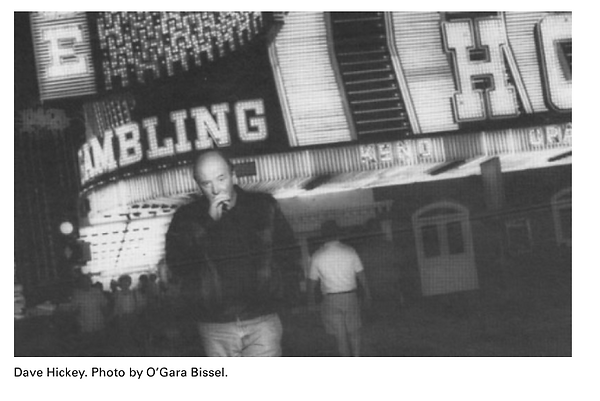
Dave Hickey: now and in the future
Dave Hickey (born Dec. 5, 1938) was foremost a writer. He wrote short stories, fiction and journalism. Sometimes he wrote about music having at a very young age learned about music from his car salesman/ jazz-musician father — he also wrote songs for the likes of Waylon Jennings. Most importantly, Hickey given his good old boy personae was an art critic who came out of the West and wrote in plain-speak — this was accompanied by a sense of contrariness and showmanship. His importance was acknowledged in 2001, when he received a MacArthur Foundation (genius) Award (2001), which he purportedly deposited most of the half-million-dollar prize into video poker machines on and off the Vegas Strip. This is the stuff legends are made of.
If Hickey had written nothing else than "The Invisible Dragon: Four Essays on Beauty” (1993), he would still have a place in the critical canon of the 1980-90s. Unlike the classic esthete, Hickey raised the issue of Beauty not in some high-minded, elitist manner, but as a social issue. In this slim volume, he espoused the view that the best art creates a community —amongst dissimilar but engaged participants and in this resides beauty. For Hickey beauty was not the quality of a thing, it was its effect. Of course such a position was immediately miss-understood as an affront as if Hickey were seeking to advance beauty as a marker of taste and privilege. The idea he was heralding a return to Beauty, immediately made it an art school must-read.
Hickey was born in Fort Worth, then transported with his family to the beaches of Los Angeles, and then back. By the late 1960s, he was running the legendary Austin, art gallery A Clean Well-Lighted Place, which was showing Minimal and Conceptual art. As a young artist on the scene, I first met Dave when he had moved to New York and became director at Reese Palley Gallery in SoHo. When the gallery closed, Dave moved on to become executive editor of Art in America. He would soon leave the art world to become a Nashville songwriter, and travel with his wife’s band, while writing music reviews for Rolling Stone Magazine and the Village Voice. After ten years of this nomadic life, Dave eventually burned out on speed. To clean himself up he went home to Fort Worth. This range of experiences understandably fed his unorthodox views concerning not just art and culture but taste in general and his in particular. Dave prided himself in being able to forgo the critical baggage and pretensions of art-speak, which was more obscurant rather than clarifying. It wasn’t that he couldn’t write such arcane treatises (in 1967, he had abandoned his PhD dissertation in linguistics at the University of Texas at Austin) he just saw no reason to. Eventually, his writing on art and culture would come to be regularly published by the small Southern California publication Art Issues.
I got to be friends with Dave in the early 1990s, when he was again spending time in NY — he was a visiting professor in architecture at Harvard University. It wasn’t until sometime later we would remember having met 20 years earlier. What connected us this time was that we had mutual friends in NY and Texas who thought we would like each other because we were both “cantankerous,” boisterous and political. Having replaced “speed” with a constant intake of nicotine and caffeine, Dave’s delivery of his views and insights were always impolite, yet to the point. Much of what drove Dave’s positions was a sense that art, which was once seen as a quarrelsome forum, was being overrun by the greed and ignorance of investment markets, which for him represented the dangers of neo-liberal politics and culture. The collection of essays "Air Guitar: Essays on Art and Democracy" (1997) records his response to the deep recession of the 1980s, and the embrace by the museums and art schools of identity politics and institutional critique.
I interviewed Dave in 1995 for Bomb Magazine, which explored various political and cultural themes. At another time we performed together at the School of Visual Arts on the occasion of the Jasper Johns retrospect at the Whitney; debating the pros and cons of Johns’ virtues. Our relative positions were determined by the flip of a coin, Dave lost the toss and had to argue the pro-position. For very different reasons seemingly, both of us thought Johns was over-rated. One of my favorite memories is the time I called Dave to discuss some matters, he apologized that he couldn't speak because at that moment he and Robert Irwin were on there way to Vegas- Dave owed $18,000 in back taxes and this was how he was going to raise the money- Two days later he called to let me know he could now talk having accomplished his goal. Dave Hickey died on Nov. 12 , 2021, at home in Santa Fe, N.M., just shy of his 83th birthday.
-Saul Ostrow, NOV 30, 2021, New York
Dave Hickey: "Well, forgive me, but what do I care about fashion? I’m a writer, not a super-model. What’s more, I’m a writer who lives in Las Vegas (laughter), which is the opposite of everything right and good and fashionable. Vegas are a permissive, unfashionable, commercial town and I’m a permissive, unfashionable commercial guy. I do retail. I write words, I get money, I buy Wheaties, I get calories, I write words, etcetera. That’s commerce. Also I am an art critic, which is the single unfundable, ungrantable, unendowable endeavor that is even vaguely connected with the arts. And justifiably so, in my case, since I am not with the program."
- "Dave Hickey" by Saul Ostrow Bomb Magazine, April 1995. < https://bombmagazine.org/articles/dave-hickey/>

